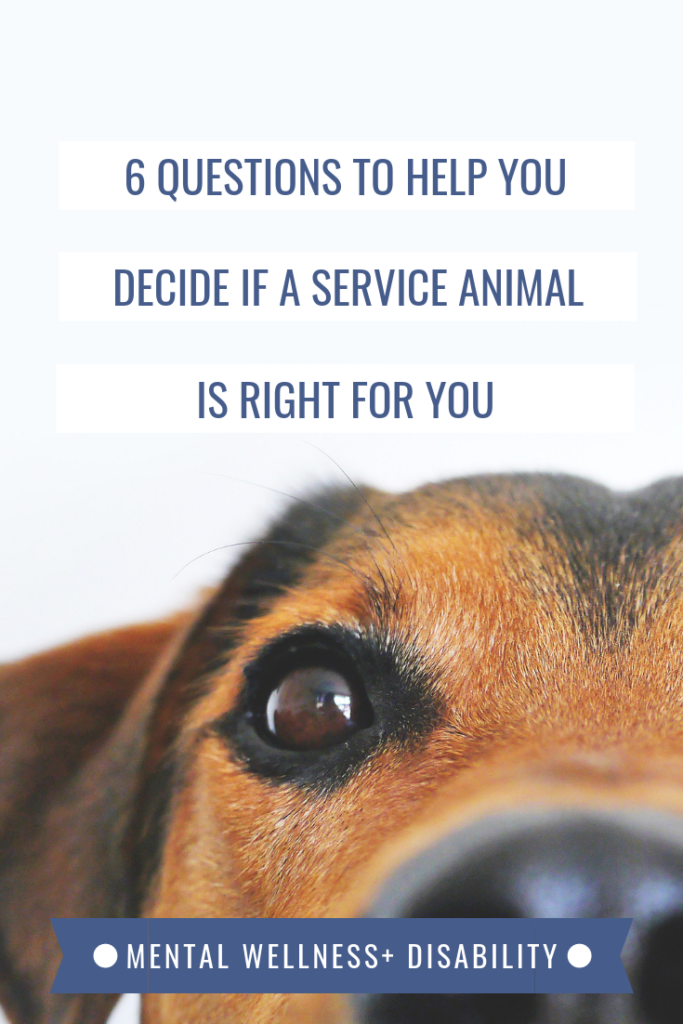Many of my counseling clients with acquired disabilities have wondered whether they should get a service animal. And they’re not the only ones.
I was recently interviewed by Tonic about what makes someone a good candidate for a service animal, and what handlers can expect during the match process. You can read the article ‘Everything you need to know before getting a service dog’ here.
In this post, I want to offer additional guidance to people with acquired disabilities who are wondering whether a service animal could help them.

But, because Emotional Support Animals are in the news quite a bit these days, it might be helpful to explain how they’re different from Service animals.
What’s the difference between a service animal and an emotional support animal?
A service animal is any dog that is individually trained to do work or perform tasks for the benefit of a person with a disability. The disability might be physical, sensory, psychiatric, or intellectual. Tasks performed can include, among other things, pulling a wheelchair, retrieving dropped items, alerting a person to a sound, reminding a person to take medication, or pressing an elevator button. The Americans with Disabilities Act protects service animals, allowing them access to restaurants, hospitals, stores, and other places that pets can’t go.
Emotional support animals are companion animals that provide therapeutic contact to an individual, but they are not service animals under the ADA. Service animals are trained to perform specific tasks, while emotional support animals receive no specific training. Any animal that provides support, well-being, or comfort to an individual through companionship and affection may be regarded as an emotional support animal. In the US, emotional support animals are exempted from certain rules against having animals in most housing and travel situations.
The important distinction is that a doctor’s letter does not turn a pet or an emotional support animal into a service animal.
These are the 6 questions to ask yourself to help you decide if a service animal is right for you.
1. Do I really love dogs enough to have one with me all the time?
If you are allergic to dogs, or just don’t love dogs all that much, then a service animal is just not the choice for you.
For you to be an effective service dog handler, your dog must be a constant presence in your life. They will be with you all the time. When you go to work. When you travel. At the grocery store and the movie theater. Right beside you when you’re sleeping. ALL. THE. TIME.
The ideal service animal handler is a dog lover, someone who will enjoy doing ongoing training with their dog. If that’s not you, you should look for alternative supports.
2. How might my life look 10-15 years from now?
I’ve had many counseling clients with disabilities who have regretted getting a service dog. Not because they didn’t love the dog, or because the dog didn’t perform its job. Usually, if someone regrets getting a service dog, it’s for just the opposite reason.
Service dogs are bred to work, and they are taught to love working from the time they’re born. These are dogs who thrive when they have a job to do. They benefit from ongoing training, mental stimulation, and lots of physical exercise to keep them balanced and healthy.
I will often talk with service dog handlers who describe that they got their dog when they were young and single. A decade later they’re married and have kids, and they just don’t have time for the dog anymore. They love the dog and appreciate the tasks it assists with. But at the same time they recognize that they aren’t able to give the dog the attention that it needs.
How might my disability change in 10-15 years?
Related to this, I recommend that clients consider how their disability may progress or change over time before getting a service dog.
In the Tonic article, I shared an example of someone I knew whose disability progressed to the point that they were truly unable to care for their animal any longer. The dog developed behavioral problems. It began destroying property, and, most importantly, stopped doing it’s assigned tasks. Ultimately, the handler had to return to the dog to the agency he’d gotten it from.
While this example isn’t common, it does illustrate why it’s important to think about how your life may change over time. A service animal may be a great choice for you now. But if you are likely to have some drastic changes in your abilities in the coming years, you might want to look for alternative options.
3. Am I OK with being highly visible?
Having a service dog makes you an immediate source of interest. You will no longer be able to just zip in and out of the grocery store unnoticed.
This is especially critical to think about if you have a hidden disability.
It can be unnerving to suddenly have everyone staring at you.People will be looking at you, and will probably want to talk to you. If a person can’t look at you and know that you have some underlying needs, handling a service dog invites people to look and wonder.
Most people assume that a person with a legitimate need for a service dog will have a visible disability. They imagine that a handler will use a wheelchair, or be obviously blind and use a cane.
Of course, this is just not the case.
Many people who benefit from service animals have invisible disabilities like Traumatic Brain Injury, epilepsy, Aphasia, and other needs that no one can see just by looking at the person.
4. Will I enjoy talking to EVERYONE, and correcting them if necessary?
As I mentioned, there are no more quick trips anywhere when you have a service animal.
It isn’t your dog that will slow you down. It’s everyone who wants to talk to you about your dog. They’ll want to learn all about your dog. Then they’ll tell you all about their dog, and how Fido would be such a great service dog…if only…there’s always an ‘if only’ in these conversations!.
People will ask:
- what your dog’s job is
- where you got your dog
- how much your dog cost
- if the dog has ever saved your life
and so on.
Many handlers describe feeling that other people behave as if they have a ‘right’ to know very intimate details about your health and your life and your dog.
I recommend that my clients considering handling a service dog really think about if they are comfortable telling perfect strangers “No”.
Some people will also assume that it is OK for them to approach your dog, distract them, and pet them. For your dog to properly do it’s job, it must be focused solely on you. You’ll need to be comfortable telling other people to leave your dog alone and allow it to work. If you don’t, you’re jeopardizing your safety and your dog’s training.
5. Am I OK with people being suspicious of me and thinking I’m faking?
If your disability is invisible, some people may think that you’re ‘faking it’.
This can be especially true if your dog also doesn’t ‘fit’ what people imagine a service dog will look like. Most people visualize a large, well-known breed when they think of a service animal. They imagine a German Shepherd or a Golden Retriever. But the truth is, many service dogs are mixed breed dogs, or small dogs.
Consider for example a dog whose task is to alert its diabetic owner that their blood sugar level has dropped. This dog must be small enough that its handler can wear it in a chest carrier, so that it can sniff its owner’s breath for the scent of hypoglycemia. The handler who benefits from this dog’s impressive training will almost certainly be called a faker, though. If you carry a dog in a small pouch into a restaurant, you will feel the weight of stares from people who don’t understand what they’re seeing.
Employees and even business owners will probably ask you LOTS of inappropriate questions.
The only two questions that a business may legally ask about your service dog are:
- Is the animal required because of a disability?
- What work or task has the animal been trained to perform?
They can’t ask to see certification (because there is no national registry or certification of service dogs).
A business can’t ask for you a note from your Doctor stating that you have a disability.
They can’t ask to see the dog perform its task, or request the dog’s vaccination records.
But you will be asked all of these questions and others if you have a service animal. Many handlers are not prepared for the questions and suspicion that confront them when they go into public places with their dog.
Some handlers prepare for the questions, and view themselves as an advocate for service dogs. They love to engage and teach others about the work their dog is doing.
For some though, the added attention and the assumption that they are faking add unwanted levels of stress to their day. For these people, a service dog is often not the best choice.
6. Is it possible that there’s a technology out there that might better suit my lifestyle?
The options for alternatives to service dogs are increasing every day as technology advances.
Take for example the classic example of a blind individual who uses a guide dog for navigation. eSight glasses can help people with low vision see. Or they can use Aira (EYE-Ra) smart glasses to connect with a visual interpreter to help them navigate their environment in real time. That person can help them pick the best tomato and chop it once they get home, tasks that are harder for a dog to assist with.
Plus, insurance may cover these technologies, whereas insurance doesn’t pay for service dogs.
Before assuming that a dog is the only option to help you with safe access, you may want to research if any new technology might be a better fit for your needs.
I hope that this post has given you some ideas of the challenges that service dog handlers face. These questions to ask yourself before getting a service dog will hopefully help you decide if an animal is the best support for your needs.
Still can’t get enough service animals?
Head over to Facebook and check out this video, a quick quiz to test your knowledge of service dogs. You’ll also get to meet Biscuit, my therapy-dog-in-training!









